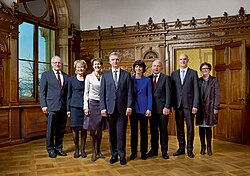Didier Burkhalter | |
|---|---|
 | |
| Chair of the Organization for Security and Co-operation in Europe | |
| In office 1 January 2014 –31 December 2014 | |
| Preceded by | Leonid Kozhara |
| Succeeded by | Ivica Dačić |
| President of Switzerland | |
| In office 1 January 2014 –31 December 2014 | |
| Vice President | Simonetta Sommaruga |
| Preceded by | Ueli Maurer |
| Succeeded by | Simonetta Sommaruga |
| Vice President of Switzerland | |
| In office 1 January 2013 –31 December 2013 | |
| President | Ueli Maurer |
| Preceded by | Ueli Maurer |
| Succeeded by | Simonetta Sommaruga |
| Head of the Department of Foreign Affairs | |
| In office 1 January 2012 –31 October 2017 | |
| Preceded by | Micheline Calmy-Rey |
| Succeeded by | Ignazio Cassis |
| Head of the Department of Home Affairs | |
| In office 1 November 2009 –31 December 2011 | |
| Preceded by | Pascal Couchepin |
| Succeeded by | Alain Berset |
| Member of the Swiss Federal Council | |
| In office 1 November 2009 –31 October 2017 | |
| Preceded by | Pascal Couchepin |
| Succeeded by | Ignazio Cassis |
| Personal details | |
| Born | Didier Eric Burkhalter 17 April 1960 |
| Party | Free Democratic Party (until 2009) FDP.The Liberals (since 2009) |
| Spouse | Friedrun Sabine Burkhalter |
| Children | 3 |
| Alma mater | University of Neuchâtel |
Didier Eric Burkhalter (born 17 April 1960) is a Swiss politician who served as a Member of the Swiss Federal Council from 2009 to 2017. A member of FDP.The Liberals,he was President of the Swiss Confederation in 2014.
Contents
Burkhalter was elected to the Swiss Federal Council on 16 September 2009;he succeeded Pascal Couchepin on 1 November 2009 when he became head of the Federal Department of Home Affairs. From 1 January 2012 to 31 October 2017,he served as head of the Federal Department of Foreign Affairs. [1] As President of the Swiss Confederation,he served as Chairman-in-Office of the Organization for Security and Co-operation in Europe (OSCE) in 2014. He left the Federal Council on 31 October 2017. [2]

